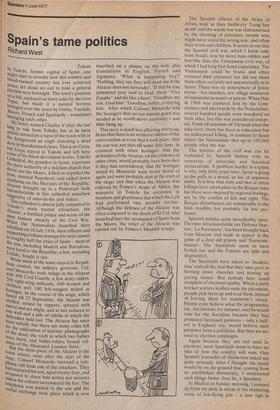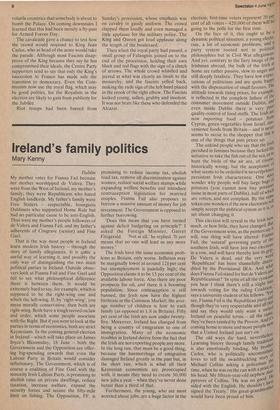Spain's tame politics
Richard West
In Toledo, former capital of Spain, one might start to wonder how this sombre and bloodstained country has ever achieved Peace, let alone set out to hold a general election next fortnight. The town's position ,On a hill, enclosed on three sides by the river tagos, has made it a natural fortress besieged over the years by Goths, Vandals, Moors, French and Spaniards — sometimes besieging
, each other. 1vt ,
artistic attraction a view of the town with in the foreground an eagle clutching a dead dove in bloodstained claws. This is no Goya, but Goya stayed in Toledo and left here some of his finest devotional works. Toledo Cathedral, the grandest in Spain, expresses the stern authority of a militant church that drove out the Moors, killed or expelled the Jews, resisted Napoleon, and called down anathema on the Marxists of the Republic. AnYone brought up as a Protestant feels uncomfortable in this cathedral somehow suggestive of auto-da-fes and stakes.
The cathedral is almost jolly compared to
ioledo's main tourist attraction, the Alcazar, a fortified palace and scene of the most famous atrocity of the Civil War. When the Nationalists launched their rebellion on 18 July 1936, their officers and s uPPorting civilians managed to seize power in roughly half the cities of Spain — most of the rest, including Madrid and Barcelona, _Were loyal to the Republic; a few, including I oledo• 1.
While most of the town stayed in Repub
lican control, the military governor, Col°net Moscardo, took refuge in the Alcazar With 800 Civil Guards, a few army cadets, 200 right-wing militants, 600 women and Children hildren and 100 left-wingers seized as ,nostages. In the course of the seige, which lasted till 27 September, the Alcazar was Shelled, mined by sappers; sprayed with Petrol and set alight, and at last reduced to 011e wall and a pile of rubble in which the defenders held out. The Alcazar has since been rebuilt, but there are many relics left for the edification of tourists: photographs of the dead, the vault in which two babies Were born, and bullet-ridden bound volumes of the Illustrated London News.
But the show-piece of the Alcazar is the
r(,)oin where, soon after the start of the siege, Colonel Moscardo received a telephone call from one of the attackers. They had captured his son, aged twenty-four, and Proposed to shoot him within ten minutes
unless the colonel surrendered the fort. The telephone was passed to the son and the verbal exchange took place which is now inscribed on a plaque on the wall, plus translations in English, French and Japanese: 'What is happening boy?' 'Nothing, they say they will shoot me if the Alcazar &es not surrender'. 'If that be true commend your soul to God, shout "Viva Espana" and die like a hero'. 'Goodbye, my son, a last kiss'. 'Goodbye, father, a very big kiss'. After which Colonel Moscardo told the beseigers that no ten-minute grace was needed as he would never surrender — and then hung up. This story is much less affecting when one hears that there is no written evidence of the conversation or even that it took place; that the son was not shot till some days later, in common with other hostages; that the defenders of the Alcazar, on the evidence of other cities, would probably have been shot if they had surrendered; that the hostages seized by Moscardo were never heard of again and were probably shot at the start of the siege; and that when the Alcazar was relieved by Franco's Army of Africa, the massacre in Toledo far exceeded in numbers and ghastliness that which the Left had performed two months earlier. Although the defence of the Alcazar was often compared to the deeds of El Cid, who' launched here the reconquest of Spain from the Moors, the relief of the Alcazar was carried out by Franco's Moorish troops. The Spanish officers of the Army of Africa took as their battle-cry 'Long live death' and the whole war was characterised by the shooting of prisoners, people who might have voted the wrong way, and often their wives and children. It seems to me that the Spanish civil war, which I know only from books, was far more hate-ridden and horrible than the Vietnamese civil war, of which I had long first-hand experience. The Vietnamese could be brutal and often tortured their prisoners but did not shoot them often, certainly not automatically as in Spain. There was no atmosphere of police terror — few murders, few village massacres of unpopular peasants or priests. When Hue in 1968 was captured first by the Corn-' munists and afterwards by the Nationalists, several hundred people were murdered on both sides, but this was considered untypical. From all accounts of Vietnam since the take-over, there has been re-education but no widespread killing, in contrast to Spain where the Nationalists shot up to 100,000 people after the war.
The horrors of the civil war can be explained by Spanish history with its centuries of atrocities and fanatical persecutions. A problem harder to explain is why, only forty years. later, Spain is going to the polls in a mood, so far, of apparent amity. It is true that riots and two or three killings have taken place in the Basque zone but these were inspired by regional feelings, not by the conflict of left and right. The Basque disturbances are comparable to the
Irish troubles but probably far less profound.
Spanish politics seem inexplicably tame. The once ferocious battle axe Dolores lbarruri, 'La Pasionaria', has been brought back from Moscow and made to appear in the guise of a dear old granny and 'Eurocommunist'. The Anarchists seem to have fizzled out and the Fascists are split and disgruntled.
The Spaniards have taken to 'moderation' with all the zeal that they once gave to burning down churches and tearing up paving stones. But nobody here could complain of electoral apathy. When a party worker scatters leaflets onto the pavement, people pick them up and read them, instead of leaving them for tomorrow's sweep. People even believe what the programmes say. An old man, for instance, said he would vote for the Socialists because they had promised increased pensions — only a halfwit in England, say, would believe such promises from a politician. But then we are used to election campaigns.
Again because they are not used to elections, most Spaniards seem to have no idea of how the country will vote. One Spanish journalist 'of distinction asked me quite seriously what I thought the 'result would be on the ground that, coming from an established democracy, I understood such things better than he, a Spaniard.
In Madrid on Sunday morning, I jumped up from my desk in alarm at the shattering noise of low-flying jets — a sure sign in volatile countries that somebody is about to bomb the Palace. On coming downstairs I learned that this had been merely a fly-past for Armed Forces Day, The cavalcade gave a chance to test how the crowd would respond to King Juan Carlos, who as head of the army would take the parade. Although most Fascists disapprove of the King because they say he has compromised their ideals, the Centre Party supporters tend to say that only the King's succession to Franco has made safe the transition to democracy. Even the Communists now use the royal flag, which may be good politics, for the Royalists in the election are likely to gain from publicity for the Jubilee. Sunday's procession, whose emphasis was on cavalry in gaudy uniform. The crowd clapped them loudly and even managed a little applause for the military police. The King and Queen got loud applause along the length of the boulevard.
Then when the royal party had passed, a small group of Falangists joined on to the end of the procession, holding their own black and red flags with the sign of a clutch of arrows. The whole crowd whistled and jeered at what was clearly an insult to the monarchy, and the fascists yelled back, making the rude sign of the left hand placed in the crook of the right elbow. The Fascists looked young, sullen, grubby and insolent. It was not brats like these who defended the Alcazar.



































 Previous page
Previous page